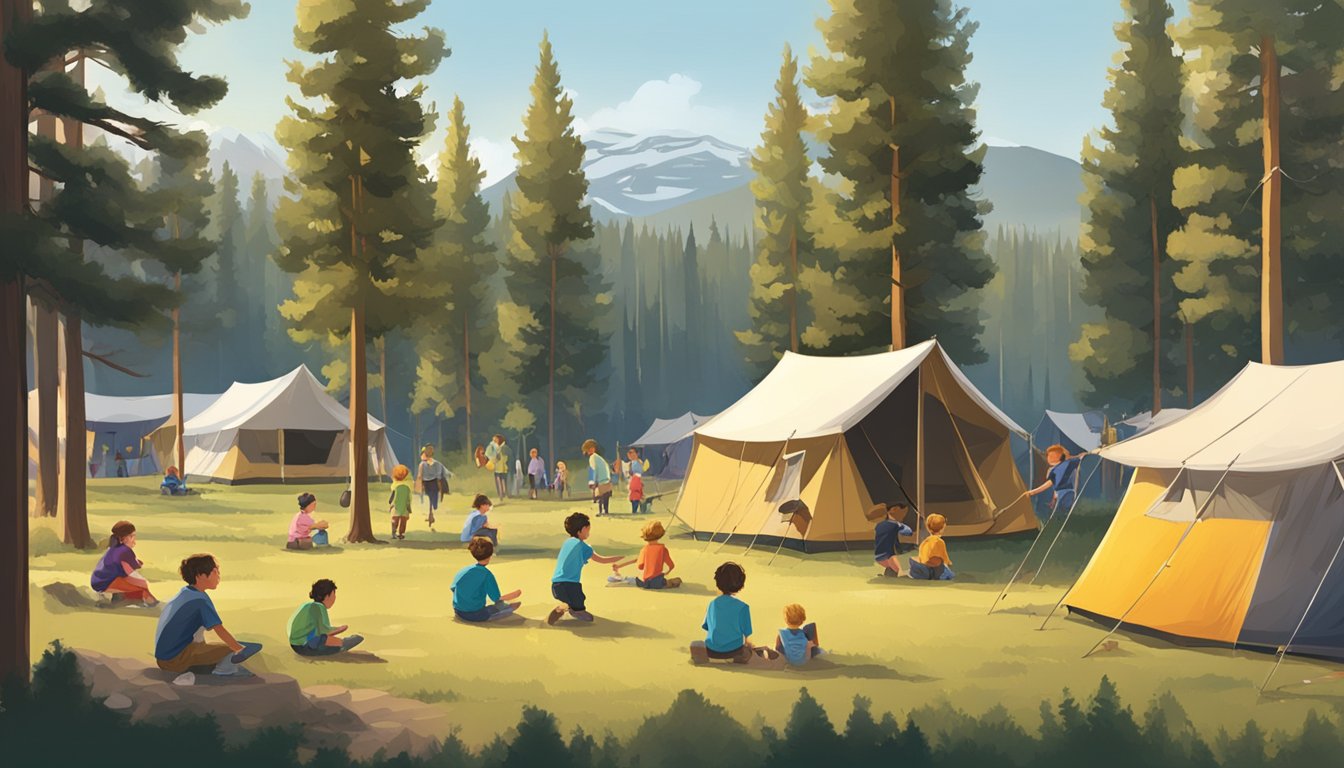Yellowstone, the hit drama series created by Taylor Sheridan for Paramount Network, offers viewers a glimpse into the rugged world of Montana ranching. While the show doesn’t explicitly feature a traditional summer camp, it does showcase a unique interpretation of the concept through John Dutton’s experiences.
In Yellowstone, “summer camp” refers to John Dutton’s temporary living arrangements on the ranch during warmer months. This setup allows the Dutton patriarch to immerse himself in the day-to-day operations of his vast property. It’s a far cry from the typical image of children roasting marshmallows and singing campfire songs.
John’s summer camp consists of a tent pitched on the ranch grounds, providing him with a simpler lifestyle closer to nature and his beloved land. This arrangement reflects the show’s themes of connection to the land and the importance of hands-on ranch management. It also serves as a storytelling device, allowing for unique interactions and character development in the series.
Concept of Summer Camp in Yellowstone

Summer camp in Yellowstone serves as a pivotal setting for character development and environmental themes. It brings together youth and nature, creating opportunities for education and personal growth.
Summer Higgins Character Profile
Summer Higgins, portrayed by Piper Perabo, is an environmental activist and protestor who arrives in Montana. She holds strong convictions about protecting the land and wildlife of Yellowstone. Summer’s background includes extensive experience in organizing protests and rallying support for environmental causes.
Her character is passionate, outspoken, and often at odds with local ranchers and landowners. Summer’s beliefs frequently clash with the traditional ways of life in the Yellowstone area. This conflict drives much of her storyline and interactions with other characters.
Role in the Story
Summer’s involvement with the summer camp program in Yellowstone is central to her character arc. She uses the camp as a platform to educate young people about environmental issues and conservation efforts. Her teachings often focus on the impact of ranching and development on the local ecosystem.
Summer’s presence at the camp creates tension with other characters who view her methods as extreme. Her role sparks debates about land use, wildlife protection, and the balance between preservation and economic interests. Through the summer camp, Summer influences the younger generation’s perspective on environmental stewardship.
Summer Camp’s Impact on the Dutton Family

Summer Higgins’ arrival at the Yellowstone ranch brought significant changes to the Dutton family dynamics. Her presence sparked new relationships, conflicts, and perspectives among the family members.
John Dutton’s Encounters
John Dutton’s interactions with Summer Higgins were complex and multifaceted. Initially viewing her as a threat to his ranch, John later saw potential in Summer’s environmental activism. He pardoned her from jail, recognizing her value in understanding opposing viewpoints.
This decision strained John’s relationships with local authorities and some family members. However, it also showcased his strategic thinking and willingness to adapt. John utilized Summer’s expertise to navigate environmental challenges facing the ranch.
Their relationship evolved from adversarial to cautiously respectful. Summer’s presence at the ranch allowed John to gain insights into the changing political landscape of Montana.
Beth’s Relationship with Summer
Beth Dutton’s relationship with Summer was marked by intense conflict and rivalry. Beth initially saw Summer as a threat to her father’s affections and the ranch’s interests. This led to manipulative actions, including orchestrating Summer’s arrest at a protest.
Despite their antagonistic start, Beth and Summer’s relationship evolved. They found common ground in their strong-willed personalities and dedication to their causes. Beth began to appreciate Summer’s environmental knowledge and its potential benefit to the ranch.
Their interactions remained tense but developed a grudging respect. Beth’s complex feelings towards Summer reflected her own struggles with change and outside influences on the Dutton family.
Kayce Dutton’s Views
Kayce Dutton‘s perspective on Summer Higgins was more neutral compared to other family members. As a former Navy SEAL and the ranch’s livestock agent, Kayce approached Summer with cautious curiosity.
He recognized the potential benefits of understanding environmental concerns for the ranch’s future. Kayce’s pragmatic approach allowed him to see beyond the initial conflicts Summer’s presence caused.
While not directly involved in most of Summer’s storylines, Kayce’s measured reactions influenced family discussions. His balanced view helped mitigate some of the tensions between Summer and other Duttons.
Kayce’s military background and connection to Native American culture gave him a unique perspective on the changes Summer represented for Montana and the ranch.
Ranch Life and Summer Camp’s Contrast

The Yellowstone series portrays a stark contrast between traditional ranching and modern environmental activism. This divide manifests in the show’s depiction of ranch life and the character Summer Higgins’ perspective as an outsider.
Ranching vs Environmentalism
Yellowstone depicts ranching as a way of life deeply rooted in tradition and hard work. The Dutton family’s ranch operates on principles passed down through generations. They value self-reliance, horsemanship, and a connection to the land. In contrast, Summer Higgins represents a modern environmental perspective. She advocates for animal rights and sustainable practices, often clashing with the ranch’s methods. This conflict highlights the tension between preserving a historic way of life and addressing contemporary environmental concerns.
Hostility Towards Industrialized Farming
The show portrays both ranchers and environmental activists as opponents of industrialized farming. Ranchers view large-scale agricultural operations as a threat to their way of life and land ownership. They fear losing their independence to corporate interests. Environmental activists like Summer oppose industrialized farming due to concerns about animal welfare and ecological impact. This shared hostility creates an unexpected common ground between these otherwise opposing groups, adding complexity to their relationships in the series.
Legal and Emotional Tensions

Summer Higgins’ involvement in Yellowstone brings a whirlwind of legal challenges and emotional conflicts. Her activism clashes with the Dutton family‘s ranching lifestyle, leading to complex legal situations and tense personal relationships.
Clemency and House Arrest Issues
Governor John Dutton grants Summer clemency, releasing her from prison. This decision places her under house arrest at the Dutton ranch. The arrangement creates an unusual living situation, forcing Summer to adapt to a lifestyle she previously opposed. Her presence on the ranch stirs up tensions with other family members, particularly Beth Dutton. The house arrest limits Summer’s movements and activities, creating a sense of confinement within the vast Yellowstone property.
Felony Aggravated Assault Aftermath
Summer faces serious legal consequences after a protest turns violent. She is charged with felony aggravated assault, a severe offense that carries significant jail time. This charge stems from an incident in Season 4, Episode 14 titled “Life Is a Promise.” The legal battle becomes a central part of Summer’s storyline, highlighting the risks associated with her activist lifestyle. The aftermath of this charge affects her relationships and future prospects within the Yellowstone universe.
Cultural Clash
Summer’s arrival at the Dutton ranch sparks a cultural clash between her environmental activism and the traditional ranching way of life. Her vegetarianism and anti-livestock views directly conflict with the Dutton family’s livelihood. This clash leads to heated debates and confrontations, particularly with Beth Dutton. Summer’s presence forces the Duttons to confront differing perspectives on land use and conservation. The cultural divide creates both tension and opportunities for character growth as Summer and the Duttons navigate their differences.
Romantic Subplots

Romance plays a significant role in Yellowstone, adding depth to the characters and driving key storylines. The show explores complex relationships against the backdrop of ranch life and family drama.
Beth and Rip’s Dynamic with Summer
Beth Dutton and Rip Wheeler’s relationship forms a central romantic storyline in Yellowstone. Their intense bond, forged through years of shared history, faces new challenges with the arrival of Summer Higgins.
Summer’s presence creates tension, particularly with Beth. As an environmental activist, Summer’s values clash with the Dutton family’s ranching lifestyle. This conflict spills over into Beth and Rip’s relationship, testing their loyalty and understanding of each other.
Rip, known for his unwavering dedication to the Dutton ranch, finds himself caught between his love for Beth and the ranch’s interests. The introduction of Summer adds a new layer of complexity to the couple’s dynamic, forcing them to navigate unfamiliar territory in their relationship.
The show skillfully weaves this romantic subplot into the broader narrative, using it to explore themes of trust, compromise, and the challenges of maintaining a relationship amidst external pressures.
Yellowstone Ranch Operations

The Yellowstone Ranch, known as the Dutton Ranch, operates as a large-scale cattle operation facing numerous challenges. The ranch’s management, relationships with neighboring tribes, and daily activities of the ranch hands form the core of its operations.
Chief Rainwater’s Perspective
Chief Rainwater, leader of the nearby Broken Rock Reservation, views the Dutton Ranch with skepticism. He believes the land rightfully belongs to his people and seeks to reclaim it. This creates tension between the Duttons and the tribe. Rainwater employs various strategies to pressure the ranch, including legal challenges and business maneuvers. His actions force the Duttons to constantly defend their property rights and way of life.
The Management of The Madison
The Madison, a river running through the Dutton property, plays a crucial role in ranch operations. It provides water for cattle and attracts wealthy fly fishermen. The Duttons carefully manage access to The Madison, balancing conservation with profit. They use it as a bargaining chip in negotiations and a source of additional income. Protecting The Madison from environmental threats and maintaining its pristine condition is a top priority for ranch management.
Ranch Hands’ Day-to-Day Activities
Ranch hands on the Yellowstone perform a variety of tasks essential to keeping the operation running smoothly. Their duties include:
- Herding and branding cattle
- Mending fences
- Breaking horses
- Monitoring livestock health
- Assisting with calving
Gator, the ranch cook, provides meals for the crew. Tate, John Dutton’s grandson, often observes and learns from the hands’ activities. The work is physically demanding and requires skill with horses and livestock. Ranch hands must be prepared to face harsh weather conditions and long hours to maintain the ranch’s functionality.
Connections to Yellowstone’s Broader Narrative

Summer camp in Yellowstone plays a pivotal role in the show’s expansive storyline, influencing character dynamics and plot developments. Its impact extends beyond a single season, shaping the future trajectory of the series and potential spinoffs.
Summer Camp’s Role in Season 5
In Season 5 of Yellowstone, summer camp emerges as a crucial setting for character growth and conflict resolution. John Dutton, now Governor of Montana, uses the camp as a strategic location to strengthen family bonds and address pressing ranch issues. The isolated environment forces characters to confront their differences, leading to unexpected alliances and rivalries.
Taylor Sheridan, the show’s creator, cleverly integrates the camp into the political storylines, showcasing how the Duttons balance their public responsibilities with private family matters. The camp scenes provide a stark contrast to the high-stakes political maneuvering in Helena, offering viewers a more intimate look at the characters’ motivations and vulnerabilities.
Implications for Future Seasons
The events at summer camp in Season 5 set the stage for significant developments in upcoming seasons. Relationships forged or strained during this time will likely have lasting consequences for the Dutton family and their allies. The camp’s remote location may also serve as a backdrop for introducing new threats or opportunities for the ranch.
Paramount Network executives have hinted that the summer camp storyline opens up fresh narrative possibilities, potentially exploring themes of legacy, conservation, and the changing face of the American West. As the show progresses, the camp could become a recurring element, serving as a touchstone for characters to reflect on their evolving roles within the Dutton empire.
Links to Possible Spinoff
The summer camp storyline in Yellowstone has sparked speculation about potential spinoff series. Industry insiders suggest that Taylor Sheridan and Paramount Network are considering a young adult-focused show centered around the next generation of ranchers and conservationists who attend the camp.
This spinoff could delve deeper into the environmental and cultural conflicts touched upon in the main series, offering a fresh perspective on the challenges facing modern-day Montana. The camp’s diverse attendees could provide a platform to explore various viewpoints on land use, Native American rights, and the future of ranching in the West.
While no official announcements have been made, the rich storytelling potential of the summer camp concept aligns with Sheridan’s expanding Yellowstone universe, which already includes prequels like “1883” and “1923.”



